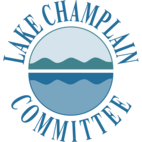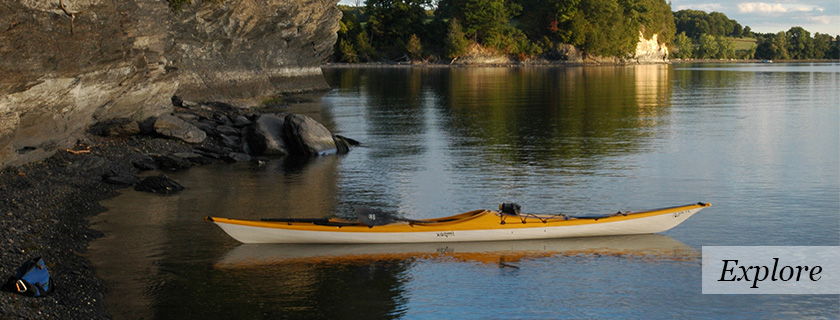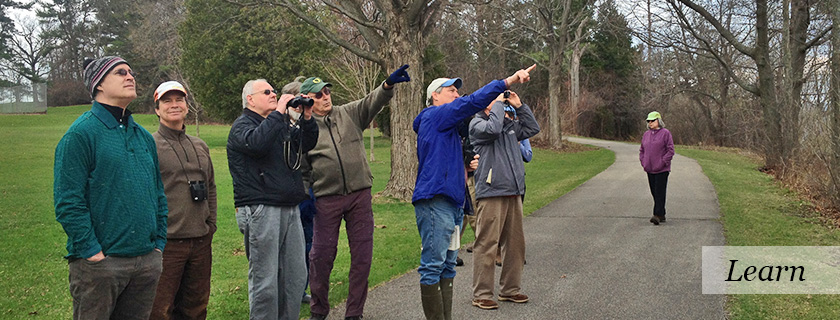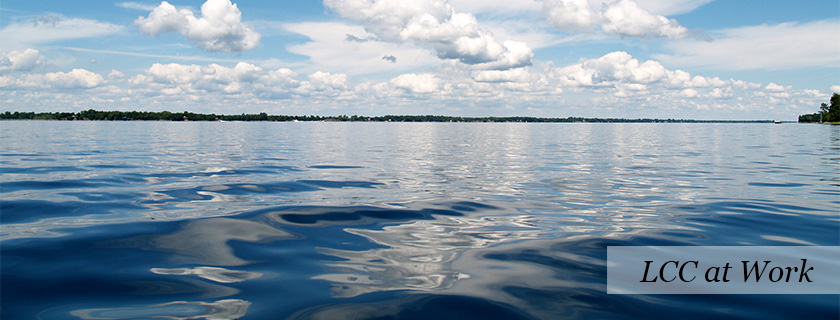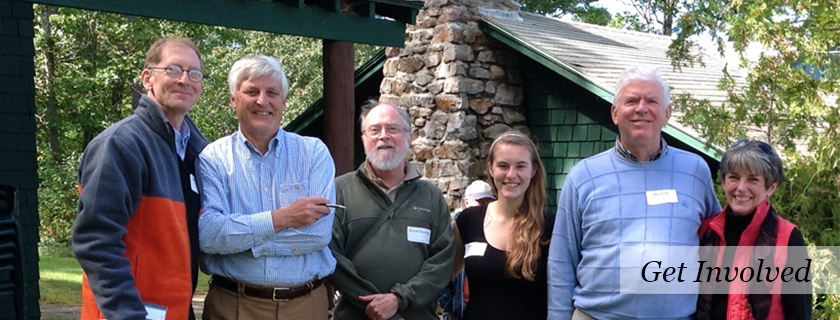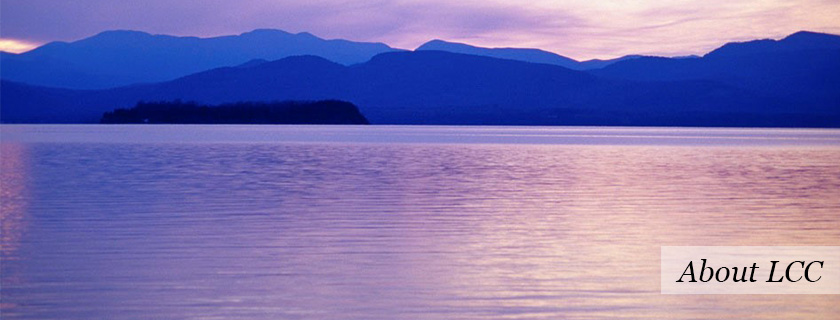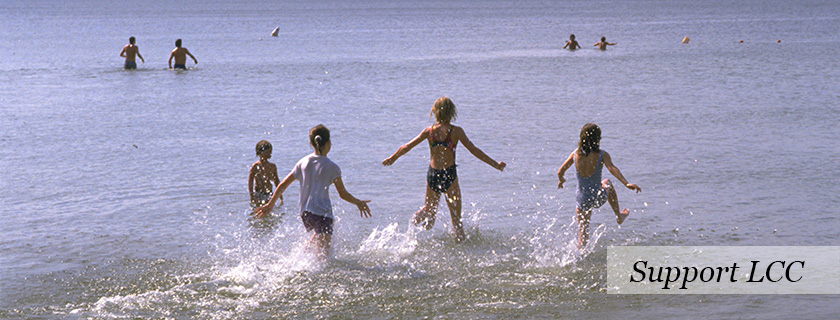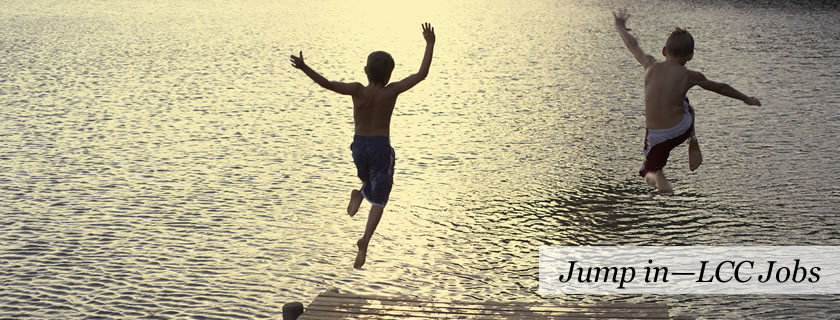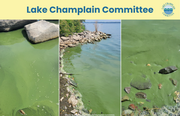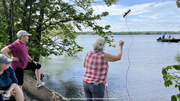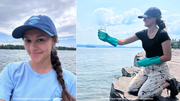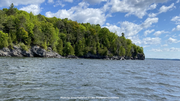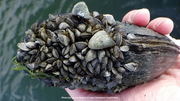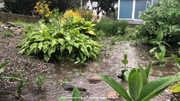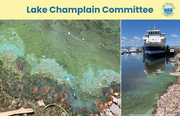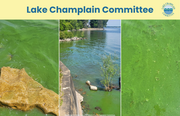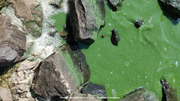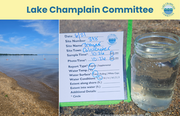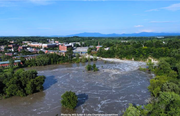Thank you for signing up to receive the Lake Champlain Committee (LCC) Cyanobacteria monitoring reports! In this email, you will find details of Week 4 monitoring results. Click on the links to see a dense bloom at Corlear Bay, meet part of the Burlington Parks team in this week's Monitor Spotlight, view striking swirls of blue and green in Keeseville, check out a thick surface bloom at Shelburne Pond, and observe a high alert bloom in Whiskey Bay. Read...
Latest Updates
The day after a heat wave swept through the Champlain Valley, the clouds lifted to reveal a brilliant sunset over Lake Champlain. As LCC staff, board members, volunteers, colleagues, and friends gathered at the St. John’s Club in Burlington, the setting sun served as a fitting metaphor for the occasion: the retirement celebration of former LCC Executive Director Lori Fisher. Much like the sun, Lori supplied life-force energy to LCC for over 40 years. Read...
In 2023, LCC started the Champlain Aquatic invasive Monitoring Program, aka CHAMP. Through this program, we train, support, and empower community scientists from all around Lake Champlain to identify and survey for aquatic invasive species. In 2024, a CHAMP volunteer made the first discovery of a new invasive species in Lake Champlain, the golden clam (Corbicula fluminea). As CHAMP enters its third season, we have grown from seven to over 30 volunteers, covering dozens of sites. After hosting an online training, we took to the road on a CHAMP training tour, from the lake’s southernmost point in Whitehall, NY all the way up to its northern reaches in Missisquoi Bay. The goal was to meet volunteers near the spots they plan to survey and to give a hands-on introduction to the species they’ll be looking for. Traveling with a cooler full of specimens – some pressed and laminated, others preserved in formaldehyde, and a few live specimens for good measure – we “got into the weeds” of aquatic plant identification. Read...
We are thrilled to welcome Serena Buono to the LCC team as our summer intern! Always a fan of the lake and the comforting skyline of tall mountains, Serena decided to move up from her home in Long Island, NY to study and protect the ecosystems she loves. At the end of this summer, Serena will proudly enter her senior year at the University of Vermont, majoring in Sustainability, Ecology, and Policy with a concentration in environmental policy. Her passion lies in advocating for large-scale policy changes while invigorating citizens at the grassroots level to become more involved with the environmental protection movement. Read...
We compiled an update on key legislation in Vermont and New York on issues for Lake Champlain - including road salt and agricultural pollution. Read...
Lake Champlain teems with movement in the summer: fish splash, osprey dive, and kayakers paddle. Waters warmed by the July sun seem to suffuse lake life with motion. Yet there is an animal that remains slow, if not completely still, amidst the activity of the season: the freshwater mussel. Most of us are familiar with the invasive zebra mussel. But what about the mussels native to Lake Champlain? Freshwater mussels are under threat throughout North America, including in Lake Champlain. There are 18 species of freshwater mussel in Vermont, 15 of which are considered rare or uncommon, and 10 of which are listed under the state endangered species law. Read...
Summer rainstorms can turn roads to rivers. As water travels over an impervious landscape, it collects everything within its flow, including harmful pollutants, on its way to Lake Champlain. How can we keep some of the summer deluge from becoming runoff? One particularly charming form of landscaping for water quality is the rain garden. Read...
Thank you for signing up to receive the Lake Champlain Committee (LCC) Cyanobacteria monitoring reports! In this email, you will find details of Week 3 monitoring results. Click on the links to see scenes of beachgoers unknowingly in bloom conditions, view a high-alert report from Alburgh Dunes State Park, check out bloom activity in Missisquoi Bay, meet Paul Smith in this week's Monitor Spotlight, and take in a beautiful clear-water view. Read...
Thank you for signing up to receive the Lake Champlain Committee (LCC) Cyanobacteria monitoring reports! In this email, you will find details of Week 2 monitoring results. Click on the links to familiarize yourself with the public cyanobacteria tracker map where you can view the latest reports, learn about cyanobacteria, celebrate three generations of monitors, meet monitors Laurie Sedlmayr and Alfred Cummings in our weekly Monitor Spotlight, and check out early activity at Sandbar Beach in Québec. Read...
Cyanobacteria are among the oldest forms of life on Earth. Their story begins not just before humans or mammals, but before our oxygen-rich atmosphere even existed. The blooms we see today are not due to completely new species but rather to shifting balances in the lake ecosystem. Read...
Thank you for signing up to receive the Lake Champlain Committee (LCC) Cyanobacteria monitoring reports! Monitoring began the week of June 15 and will run through early fall. Each week we’ll send you an update about conditions monitors are finding on Lake Champlain and at select inland Vermont lakes. This week’s report covers results from Sunday, June 15 through Saturday, June 21, 2025. If you’d like to learn more about cyanobacteria or join our monitoring team please sign up here. We will also hold informational sessions about how to recognize cyanobacteria later in the summer, so stay tuned. Read...
At what point does a waterway stop being a river and become part of Lake Champlain? This transition happens gradually in a zone called a river delta where a river empties into the lake. Read...
